On Broadway . . .
Page 3
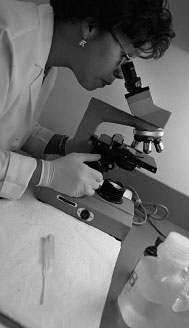
|
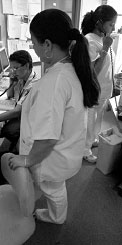
|
|
Jenyons says many gynecologists today don't even own a microscope. But she likes to examine the organisms that cause vaginitis herself, to distinguish among yeast, bacteria, and Trichomonis protozoa. "Sometimes you have a mixed infection," she says. | |
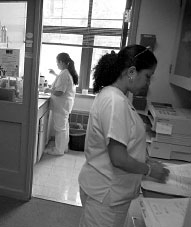
|
|
Jenyons's office is a busy place. In the above photo, L.P.N. Carla Cavarallo, front, checks a patient's chart, while medical assistant Jennifer Ortiz, rear, looks at a lab result. |
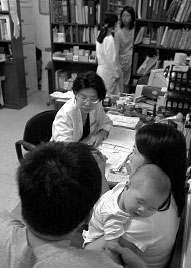
|
|
Lee says that new mothers get "kicked out" of the hospital so quickly today that "there isn't even enough time to develop a question." So she fills the gap by seeing infants frequently—within a few days of their arrival home and then once a month for the first six months. Pictured below with Lee are nine-month-old Nicholas Zhen and his father, Song Hai Zhen, and mother, Janet Tan. |
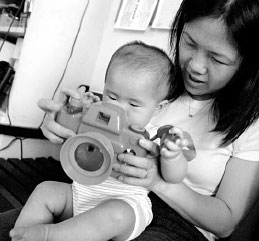
|
|
Janet Tan distracts Nicholas with a toy camera. He'll get three shots today, including for polio. He's already been immunized against hepatitis B, which is common in Chinatown. Before that vaccine became available in 1981, when Lee was still a resident, she knew a baby who died of the disease after being infected at birth. The hepatitis B vaccine, she says, "is one thing in my medical lifetime that I think is wonderful." |
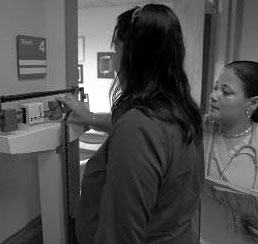
|
|
Here, medical assistant Jennifer Ortiz weighs Diana Barbaran, who was expecting her baby in about a month. (Barbaran gave birth to a baby girl on August 14 and named her Nicole. She says that Jenyons encouraged her to walk during most of the seven inhospital hours that she was in labor and never left her side.) |
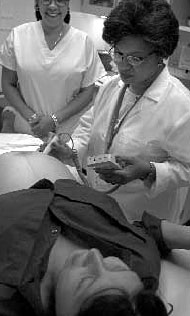
|
|
Above: Jenyons uses the Doppler to check Barbaran's baby. Barbaran emigrated from Peru and does not speak much English, so appreciates the fact that Jenyons speaks Spanish. |
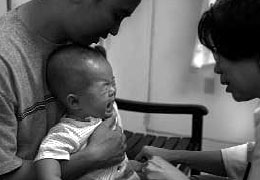
|
|
"I give my own shots, which most [pediatricians] don't," explains Lee. "It's something I've always done. It's a small office." Nicholas, now crying (above), sits on his father's lap. Because Lee's office is open on Sundays, both he and Nicholas's mother are able to come to their son's checkups. Speaking in both Cantonese and English, they ask Lee her opinion of some herbal remedies advocated by the baby's grandmother. |
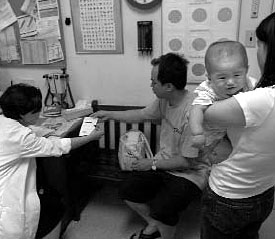
|
|
Lee "really cares about her patients," says Janet Tan. Once, when Nicholas fell and had to go to the hospital, Lee waited for a middle-of-the-night phone call to make sure he was all right. Such situations are "the most stressful part of being a pediatrician," she says. "When an ambulance whisks the family off to the nearest ER, they have to put their child's care in the hands of strangers, and they call me. I try very hard to reach them at the hospital, and to talk with them and the treating physicians. These are, after all, my babies, and I'll need to know what follow-up will be needed." |
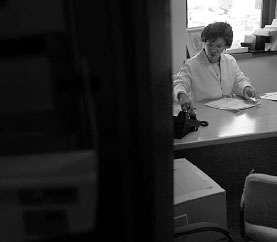
|
|
Above, Jenyons phones a patient, with the patient's chart handy, to let her know the result of a recent test. The L.P.N. in her office makes routine calls, but "some results, I do," says Jenyons. "It depends on the problem." |
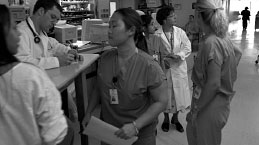
|
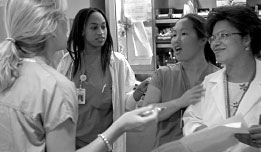
|
|
Jenyons also works with residents at St. Luke's-Roosevelt Hospital; in the lower photo above, she chats with, from the left, Jennifer Ashton, Shonda Corbett, and Esther Moon. |
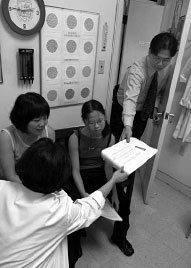
|
|
Lee's husband, Chuck Wing Lee, a nurse practitioner, works with her. "It's a real luxury and a pleasure to have someone else medical in an office," explains Elaine Lee. "It's good to have a partner if you're worried about something and you're not sure— to get another perspective, listen to a chest, look at a rash. We work very well together," she adds. Above, Chuck Lee hands a chart to his wife as a visit begins. (Note that the clock on the office wall bears the Dartmouth shield.) |
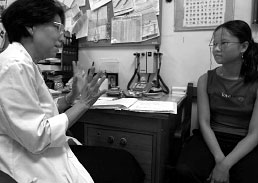
|
|
In for her annual checkup is 14-year-old Lisa Kuan. "She's an adolescent," Lee explains, "so Mom is not in the room for most of it." Lee counsels teenagers like Kuon to be wary of contacts made on the Internet. "I say this ad nauseam. I'm worried they will go places online that they shouldn't go and meet people they shouldn't. I talk about how many hours they're on the computer, I talk about posture [at the keyboard], because these people are going to be computer people for the next 60 years." |
Back to Page 2 | Forward to Page 4
